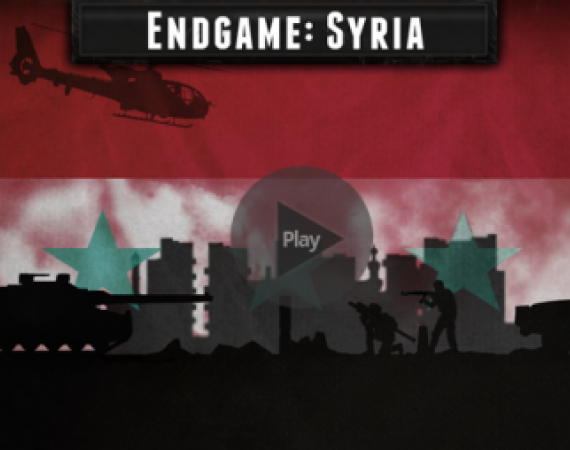Posted on Wed 22 May 2013
Endgame:Syria, News games & Making Soapboxes from Platforms: Lunchtime Talk Write-Up
On May 17 we were treated to a fantastic Lunchtime Talk from Studio alumni Tomas Rawlings, Creative Director of Auroch Digital and co-founder of Bristol Games Hub. Tomas came to the Studio to talk to us about his latest project GameTheNews.net.GameTheNews.netGameTheNews is a project developed by…

Posted by
On May 17 we were treated to a fantastic Lunchtime Talk from Studio alumni Tomas Rawlings, Creative Director of Auroch Digital and co-founder of Bristol Games Hub. Tomas came to the Studio to talk to us about his latest project GameTheNews.net.
GameTheNews.net
GameTheNews is a project developed by Auroch Digital to create games quickly that respond to current news stories. This method is called Play Based Rapid Prototyping and was derived from their experience of producing and participating in game jams (such as Gamify Your PhD, the XX Game Jam and the Wellcome Trust ExPlay Game Jam). The idea is to create very quickly, from idea to a playable game in days rather than the normal development time of months and years. This method means their games can be timely and relevant, and can respond to real world events. Tomas explained the project is still at beta – in that they’re still exploring how games can mesh with news, but told us about one of their most contentious games released so far, Endgame: Syria.
Endgame Syria
Tomas told us the story of his company's recent dealings with Apple, who controversially rejected their real time strategy game, Endgame Syria, an unflinching interactive exploration of events unfolding in Syria today.
Endgame: Syria launched on the 12th December 2012 and was one of the first ever attempts to cover an on-going conflict in the form of a video game. The game places the player in the role of coordinating the rebel side of the Syrian civil war where they have to make political and military decisions that could potentially resolve, escalate or prolong the conflict.
The game was initially rejected by Apple's App Store, citing guidelines forbidding games that “solely target a specific race, culture, a real government or corporation, or any other real entity”. Apple refusing to publish it provoked a worldwide debate about the ethics involved in using games as a way to call attention to and talk about real world issues.
As the App store is awash with games featuring real world groups and individuals from World War II and other historical conflicts, the question seemed to be more one of commenting on current affairs. The game had been accepted by other platforms including Google Play for Android phones without difficulty, so Apple’s role as a gatekeeper for iOS content posed some interesting questions for the team. Ultimately, following advice from Apple, GameTheNews published a ‘re-skinned’ version of the game, identical in every way but with the word ‘Syria’ and references to opposition groups removed. Instead they called the game ‘Endgame: Eurasia’, a tongue-in-cheek reference to Orwell’s dystopian novel 1984, where enemies are fluid and amorphous.
The game itself attracted a huge range of responses from the positive, "By addressing a current civil war and its multiple factions and infinite social complexities, Endgame: Syria is not giving us any answers -- it's encouraging us to ask more questions. Not comfortable territory for most." or "The game oozes quite some quality and is actually fun to play. ... Hopefully with this unique gamification approach, it will make more people aware of what is happening today in the beleaguered country of Syria." to "Unhelpful... You can't teach the horrors of the Syrian war through an online card game."
Tomas argued that “games encode the politics of the world around us” and are increasingly becoming a primary medium for how we make sense of our own experiences. The reporting of global affairs has long been the preserve of mainstream media, with stories told by news agencies, journalists and biographers. Tomas believes that games can offer a unique perspective – or multitude of perspectives – that can provide a powerful tool for awareness and reflection.
Members of the audience raised the issue that, as games allow players to make choices and alter the outcome of the experience, they are a completely different form to traditional media and will always be more subjective. Tomas agreed that the sense of control and agency that a player has in a game is an interesting area, and one that GameTheNews are continuing to explore. He pointed out that there is no such thing as an ‘open world’ game and that games designers are highly skilled in the art of directing player’s behaviour, creating narratives and guiding players through carefully designed environments. The experience and level of decision-making that a player will encounter is a key consideration when designing the mechanic of any game and will reflect the choice of the designer, more than the player. For example, aside from the additional time required to develop it, one key reason not to make Endgame: Syria a 3d first person shooter-style game, was that it would detract from the strategic and considered tone of the experience as it is now.
Alongside the controversy, GameTheNews have published a number of more playful news games, including Cow Crusher, a cheeky take on the horsemeat scandal and Moral Combat, a debate game pitting Obama against Romney in the run up to last year’s US presidential elections. They are now working on another heavy hitter, working title: Narcoguerra, that will look at the drugs war in Mexico.
To find out more visit GameTheNews.net and check out the games realeased with Wired and on the Huffington Post.
